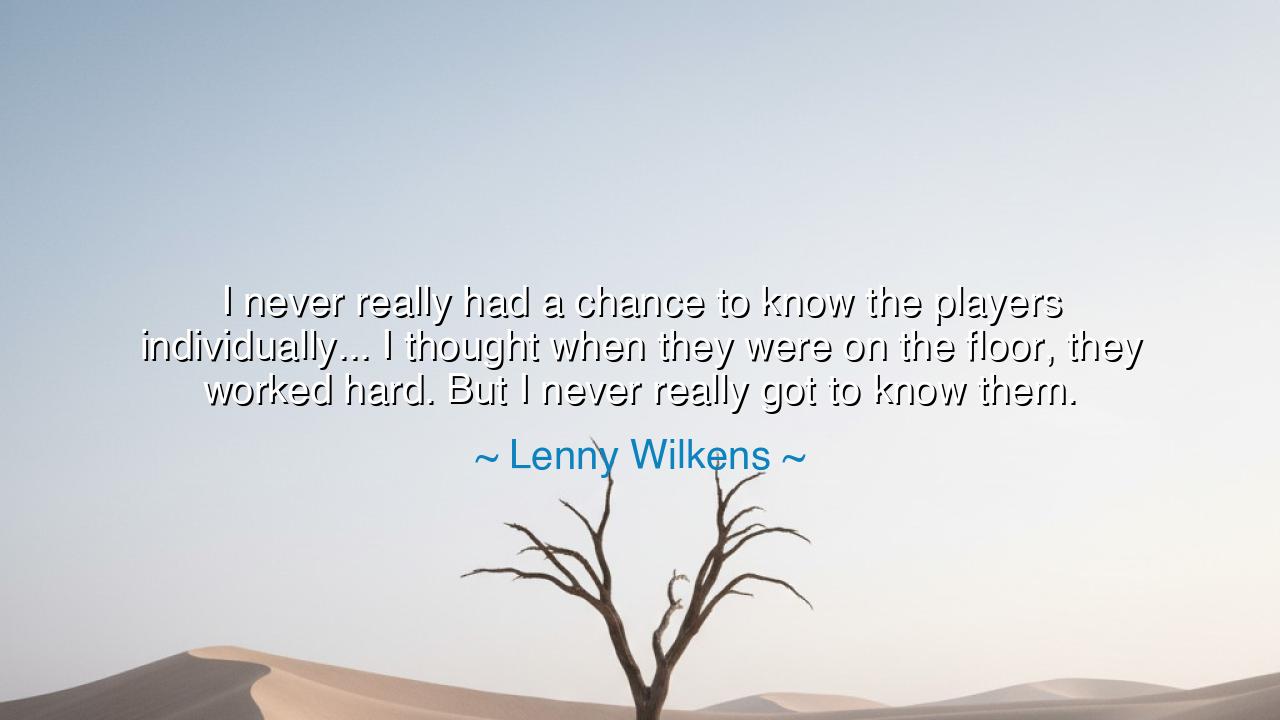
I never really had a chance to know the players individually... I
I never really had a chance to know the players individually... I thought when they were on the floor, they worked hard. But I never really got to know them.






In the words of Lenny Wilkens, "I never really had a chance to know the players individually... I thought when they were on the floor, they worked hard. But I never really got to know them," we hear a reflection on the complexity of leadership, the distance that often exists between a leader and their team, and the challenge of truly understanding those we lead. Wilkens’ statement speaks to the truth that leadership, especially in sports, is not just about the performance of the team, but also about the relationships that bind individuals together. To lead effectively, one must not only observe the work of the team but truly understand each individual on a deeper level—something that is often difficult when the demands of success can overshadow the need for genuine connection.
In ancient times, the greatest leaders understood the importance of knowing their people—not just their abilities, but their hearts and minds. Alexander the Great, for instance, led his army not only by being a brilliant strategist but by developing deep bonds with his soldiers, sharing in their hardships and struggles. His ability to relate to each individual in his army helped him build not just a force of men, but a brotherhood that was loyal and unified in their mission. In contrast, Wilkens’ reflection points to the difficulty of fully knowing his players, as the demands of his role often kept him at a distance. This distance is a challenge for many leaders—how to balance the work of achieving success with the relationship building that makes those successes meaningful.
The work ethic that Wilkens acknowledges in his players—“when they were on the floor, they worked hard”—reflects an important aspect of leadership: the ability to recognize dedication and effort, even if it is not immediately visible at a personal level. This speaks to the wisdom of ancient leaders like Julius Caesar, who recognized the importance of hard work in his soldiers and the role that discipline played in the success of the Roman Empire. While Caesar may not have known each soldier intimately, he understood that each individual’s effort contributed to the success of the whole. Similarly, Wilkens recognized that the effort of his players on the floor was valuable, even if he didn’t always have the chance to connect with them personally.
However, Wilkens’ acknowledgment of not getting to know his players individually also brings forth a truth about leadership: that success is often built on the collective effort, but it is individual relationships that can sustain and enrich that success. The greatest leaders throughout history, such as Confucius, emphasized the importance of understanding people as individuals. Confucius taught that to lead well, one must know those they lead—understanding their motivations, strengths, weaknesses, and aspirations. This knowledge allows a leader to inspire and guide each person in a way that maximizes their potential and builds a sense of shared purpose.
Wilkens’ words also remind us of the complexity of leadership in today’s world, where time and circumstances often prevent deep personal connections. The demands of modern leadership, whether in sports, business, or politics, can create barriers that keep us from fully understanding those we lead. Leaders often become consumed by the big picture—by strategy, outcomes, and performance—leaving little room for the personal relationships that are crucial for the long-term success of any endeavor. Just as Socrates understood the importance of personal dialogue in the development of young minds, modern leaders must also recognize that it is not enough to focus solely on tasks; true leadership comes from connecting with the people behind the tasks.
The lesson from Lenny Wilkens’ reflection is clear: true leadership is not simply about managing a team’s performance, but about understanding the individuals who make up that team. Whether in sports or in life, the most effective leaders are those who make the effort to connect, to build genuine relationships, and to understand what drives each individual. We must all strive to lead with empathy, compassion, and an understanding of the people we work with—not just as employees, players, or subordinates, but as individuals with unique motivations and dreams.
In our own lives, whether as leaders in our careers, communities, or families, we must seek to understand those we interact with on a deeper level. Take the time to listen, to ask meaningful questions, and to invest in relationships that go beyond the surface. Leadership is not just about driving results; it’s about nurturing the people who are part of that journey. As Wilkens points out, even in a world filled with competition and performance, the opportunity to connect personally with those around us is priceless, and it is through these connections that we build trust, loyalty, and ultimately, long-term success. Let us strive to be the kind of leaders who not only recognize hard work but also know the individuals who contribute that work and honor their journey.






AAdministratorAdministrator
Welcome, honored guests. Please leave a comment, we will respond soon